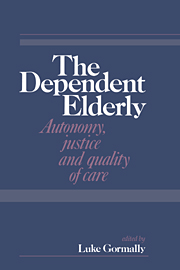Book contents
- Frontmatter
- Contents
- List of contributors
- 1 Introduction
- 2 Difficult choices in treating and feeding the debilitated elderly
- 3 The American debate about artificial nutrition and hydration
- 4 Reflections on Horan and Boyle
- 5 The Living Will: the ethical framework of a recent Report
- 6 Some reflections on euthanasia in The Netherlands
- 7 Is there a policy for the elderly needing long-term care?
- 8 Is it possible to provide good quality long-term care without unfair discrimination?
- 9 The prospects for long-term care: current policy and realistic alternatives
- 10 What is required for good quality in long-term care of the elderly?
- 11 Should age make a difference in health care entitlement?
- 12 Economic devices and ethical pitfalls: quality of life, the distribution of resources and the needs of the elderly
- 13 The Aged: non-persons, human dignity and justice
- 14 Economics, justice and the value of life: concluding remarks
- Index
14 - Economics, justice and the value of life: concluding remarks
Published online by Cambridge University Press: 01 October 2009
- Frontmatter
- Contents
- List of contributors
- 1 Introduction
- 2 Difficult choices in treating and feeding the debilitated elderly
- 3 The American debate about artificial nutrition and hydration
- 4 Reflections on Horan and Boyle
- 5 The Living Will: the ethical framework of a recent Report
- 6 Some reflections on euthanasia in The Netherlands
- 7 Is there a policy for the elderly needing long-term care?
- 8 Is it possible to provide good quality long-term care without unfair discrimination?
- 9 The prospects for long-term care: current policy and realistic alternatives
- 10 What is required for good quality in long-term care of the elderly?
- 11 Should age make a difference in health care entitlement?
- 12 Economic devices and ethical pitfalls: quality of life, the distribution of resources and the needs of the elderly
- 13 The Aged: non-persons, human dignity and justice
- 14 Economics, justice and the value of life: concluding remarks
- Index
Summary
Among the most serious efforts to settle ethical questions by economic reasoning is the Economic Analysis of Law. Richard Posner, a cultured and sophisticated professor of law at Chicago, led a movement which has undertaken a wide-ranging description and evaluation of legal arrangements in terms of their economic efficiency (maximisation of social wealth, particularly by minimisation of wasted ‘transaction costs’). At the movement's zenith, Posner himself proposed that the ethics of wealth maximisation is superior to other aggregative theories of morality, notably utilitarianism, and provides ‘a comprehensive and unitary criterion of rights and duties’ (Posner 1979, 140). Some of its results — such as that ‘people who are very poor … count only if they are part of the utility function of someone who has wealth’ — do (he conceded) ‘grate on modern sensibilities’; but none of its positions or implications, he urged, are ‘violently inconsistent with our common moral intuitions’ (ibid., 128, 131). Ten years later, and now a high-ranking federal judge, Posner withdrew his claim that Economic Analysis of Law affords an appropriate ‘comprehensive criterion’ of moral judgment, and conceded that it is open to criticisms which cannot be answered. One may doubt the philosophical depth of his formulation of the deepest criticism: that wealth maximisation's potential for approving slavery is ‘contrary to the unshakable moral intuitions of Americans’ (Posner 1990, 377).
- Type
- Chapter
- Information
- The Dependent Elderly , pp. 189 - 198Publisher: Cambridge University PressPrint publication year: 1992
- 1
- Cited by



